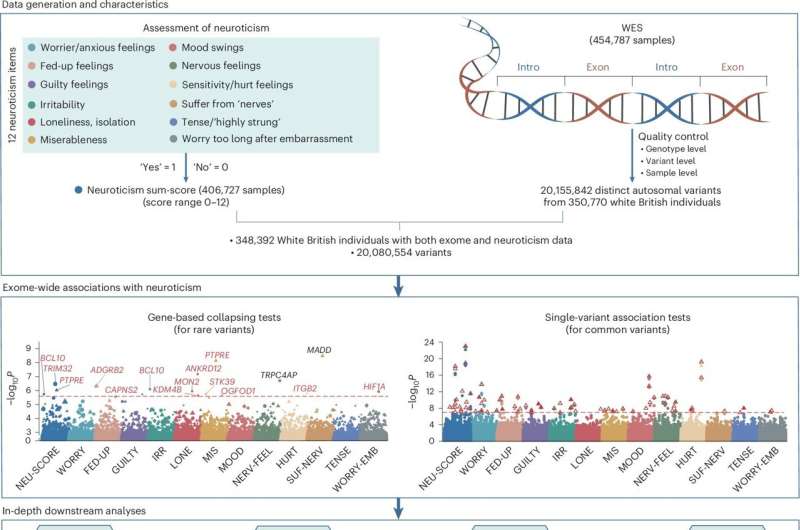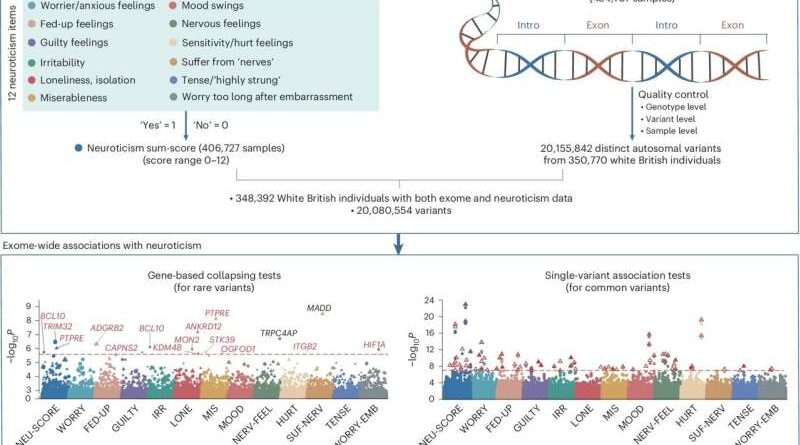A large-scale genetic study identifies 14 genes associated with neuroticism

Summary of the study. Credit: Nature Human Behavior (2024). DOI: 10.1038/s41562-024-02045-w
Neuroticism is an important personality trait defined by well-established psychological theories, associated with a tendency to emotional instability and negative emotions. Previous studies have found that this personality trait is often associated with a variety of mental health problems, as well as other chronic and acute medical conditions.
Advances in technology have opened up new opportunities for the study of genes that contribute to mental illness and disease. Similar methods may also help to identify genes that increase the likelihood of certain personality traits, including neuroticism.
Previous research has revealed more than 100 sites in the human genome that are associated with neuroticism. However, much remains to be discovered about what this personality trait is.
Researchers at Fudan University in China recently set out to further investigate the genetics of neuroticism, by analyzing data from the UK Biobank, a large database of genetic and biological information collected from people thousands in the UK. Their paper, published in Nature Human BehaviorThe data pinpointed 14 genes that were associated with neuroticism in the data they analyzed, 12 of which had not been previously identified.
“Existing genetic studies of neuroticism are largely limited to normal types,” Xin-Rui Wu, Ze-Yu Li and their colleagues wrote in their paper. “We did a large analysis of white British people from the UK Biobank, to reveal the role of coding variants in neuroticism.
“Of these, 12 (PTPRE, BCL10, TRIM32, ANKRD12, ADGRB2, MON2, HIF1A, ITGB2, STK39, CAPNS2, OGFOD1 and KDM4B) were novel, and the rest (MADD and TRPC4AP) showed evidence variable in common forms.”
The UK BioBank provides a large pool of data that researchers around the world can analyze to explore the interactions between different genes, lifestyle choices and health problems. As part of their latest study, Wu, Li and their colleagues analyzed 454,787 sequence data from the UK BioBank, to identify genes associated with neuroticism. Their analysis revealed 12 new genes related to this personality trait while confirming the relationship with neuroticism of 2 genes already revealed in previous studies.
Wu, Li and their colleagues wrote: “The presence of unusual coding variants is estimated to be as high as 7.3% for neuroticism.
“For common variants, we identified 78 significant associations, involving 6 unreported genes. We then repeated these variants using meta-analysis to across four other offspring from the UK Biobank and aggregate data from the 23andMe sample. , cognitive ability and brain structure.”
The latest findings collected by Wu, Li and colleagues contribute to the current understanding of neuroticism and its genetics. In the future, they may recommend new genetic studies that focus on neuroticism or other personality traits. Ultimately, these research efforts can inform the development of tools to diagnose and treat neuropsychiatric disorders associated with certain personality traits.
“Our findings deepen understanding of the genetic architecture of neuroticism and provide potential targets for future research,” wrote Wu, Li and their colleagues.
Additional information:
Xin-Rui Wu et al, Large exome sequencing identified 18 genes for neuroticism in 394,005 UK individuals, Nature Human Behavior (2024). DOI: 10.1038/s41562-024-02045-w.
© 2024 Science X Network
Excerpt: Large genetic study identifies 14 genes associated with neuroticism (2024, November 20) retrieved November 22, 2024 from https://medicalxpress.com/news/2024-11-large -scale-genetic-genes-linked.html
This document is subject to copyright. Except for any legitimate activity for the purpose of private study or research, no part may be reproduced without written permission. Content is provided for informational purposes only.
#largescale #genetic #study #identifies #genes #neuroticism
